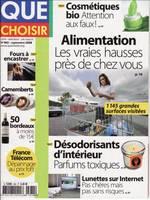 Cette note est un r??sum?? de la Conf??rence " Meeting Consumer Expectations for Natural &
Organic" faite au Natural Beauty Summit Europe le 9 octobre dernier. Si vous souhaitez avoir plus de d??tails sur son contenu, ??crivez-moi ?? [email protected] !
Cette note est un r??sum?? de la Conf??rence " Meeting Consumer Expectations for Natural &
Organic" faite au Natural Beauty Summit Europe le 9 octobre dernier. Si vous souhaitez avoir plus de d??tails sur son contenu, ??crivez-moi ?? [email protected] !
Here are the facts:
September 2008: French consumer magazine ?? Que Choisir ?? tests 22 ?? natural ?? & ?? organic ?? beauty products from 21 brands. Results show that:
- 12 brands have claims that are 100% consistent : they implement the certification requirements / they have no prohibited or dubious preservatives / they contain no allergens
- 12 ?? certified ?? brands are not 100% consistent: the products include parabens & phenoxyethanol / 9 products when contaminated see the quantity of bacterias grow! / allergens are not listed / total quantities of allergens are way too high
- 3 non certified brands have ?? natural ?? products that are not significantly different from ?? traditionnal ?? cosmetics
My take: Given the influence of this magazine, this can be devastating.
2006: The French DGCCRF controlled 47 different ?? organic ?? cosmetics products ??? all bearing ?? organic labels ??: 6 products were found to be non-consistent with the label???s criteria & 2 brands were fined for selling products that had ?? natural ?? & ?? organic ?? unsubstantiated claims.
Now for the USA: according to a 2007 report by TerraChoice Environmental Marketing, using metrics from the Federal Trade Commission (FTC)???s Environmental Marketing Claim Guidelines, an overwhelming majority of environmental claims in the US inaccurate, inappropriate or unsubstantiated: all but ONE of more than 1000 products reviewed committed at least one of the Six Sins of Greenwashing!!!
Sin of the Hidden
Trade-Off (57%): claims that suggest a product is "green"
based on a single environmental attribute.
Sin of No Proof (26%): any claim that cannot be substantiated by
easily accessible supporting information, or by a reliable third-party
certification.
Sin of Vagueness (11%): every claim that is so poorly defined or broad that its real meaning is likely to be misunderstood by the intended consumer such as chemical-free pesticide.
Sin of Irrelevance (4%): claims that may be truthful but are unimportant and unhelpful for consumers and also distracting. Worst offenders: claiming to be CFC-free, ozone-depleting chlorofluorocarbons have been outlawed since the late 1980s.
Sin of Lesser of Two Evils (1%): environmental claims that may be true, but risk distracting the consumer from the greater environmental impacts of the category as a whole such as organic tobacco or green insecticides.
Sin of Fibbing (10 products <1%): claims that are simply false, typically by misusing or misrepresenting certification by an independent authority, when no such certification had been made.
My take: ???Natural??? & ???Organic??? are a major opportunity but???.
- Beware the Golden Goose syndrom: everyone is boarding the ?? green ?? ship
- Major brands (by launching new organic lines or buying organic brands)
- Distributors with their Private Labels
- New entrants???
- ??? All come alongside established ?? natural ?? & ?? organic ?? brands
- This creates a chaotic situation in ALL categories: a new Wild West ?
- The temptation of Greenwashing
- The temptation to ?? hide ?? behind the numerous (more than 100!!!) labels with conflicting definitions
- Never forget consumers ??? and specifically those that adhere to ?? natural & organic ?? ??? are educated and often ?? fluent in cosmetics ?????
- Building a (long-term) brand is building trust
- The winners (survivors ?) will be those that will be consistent ??? and trustworthy !
